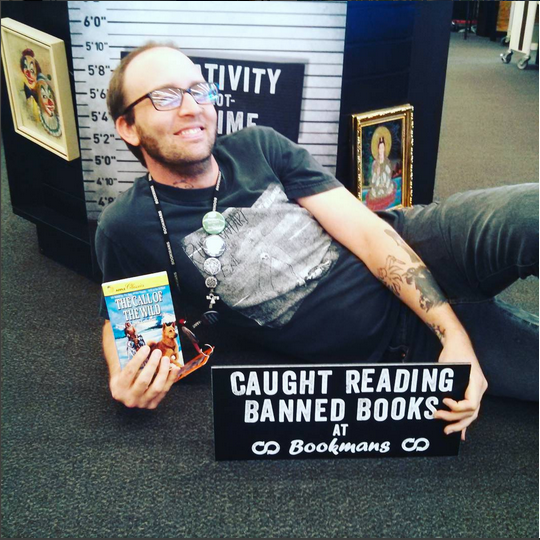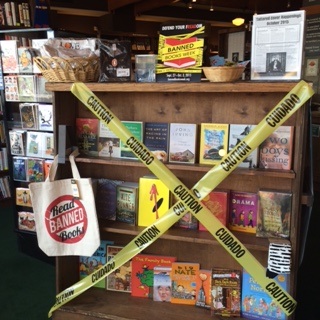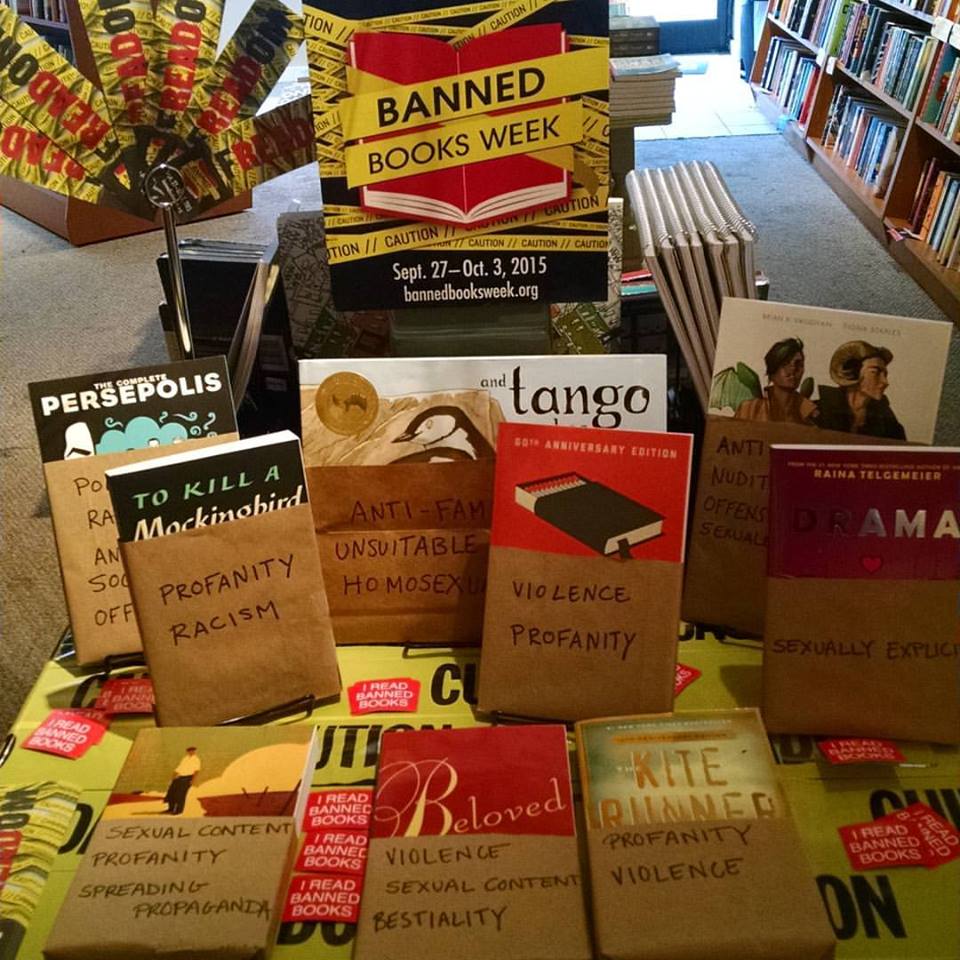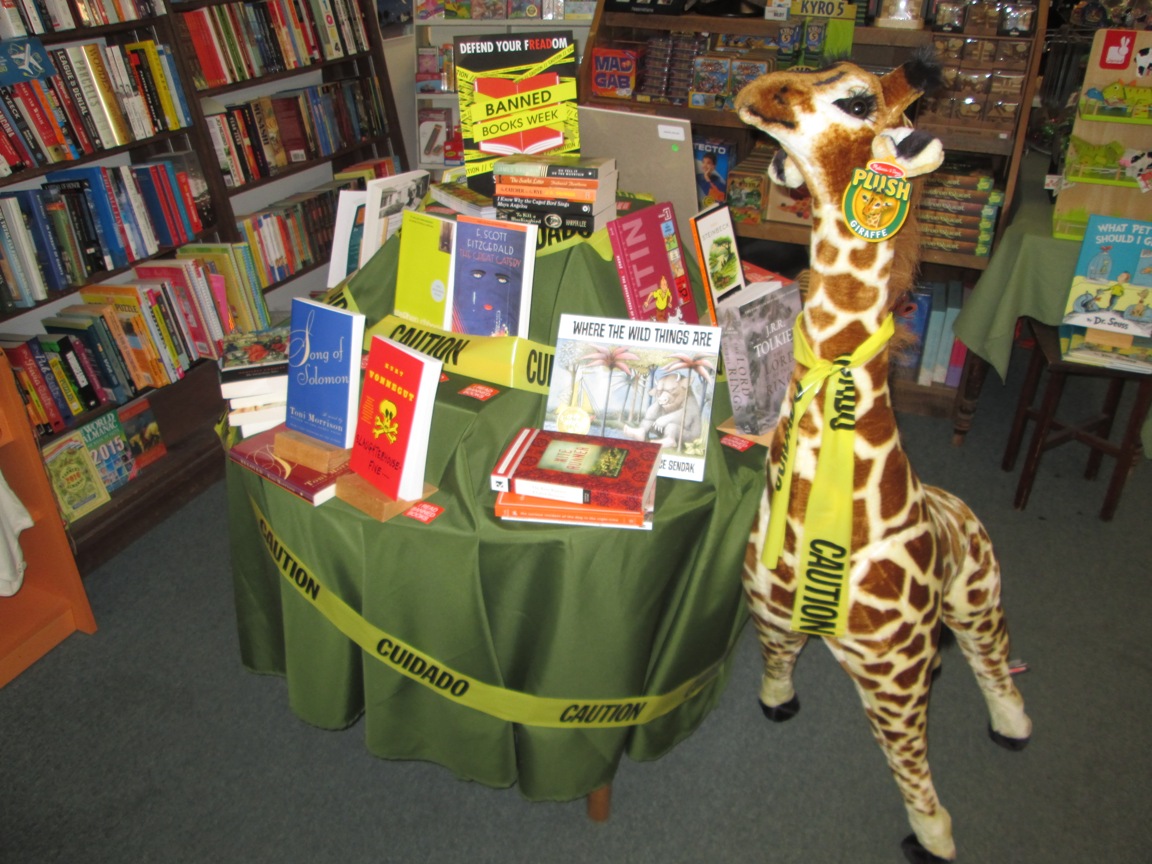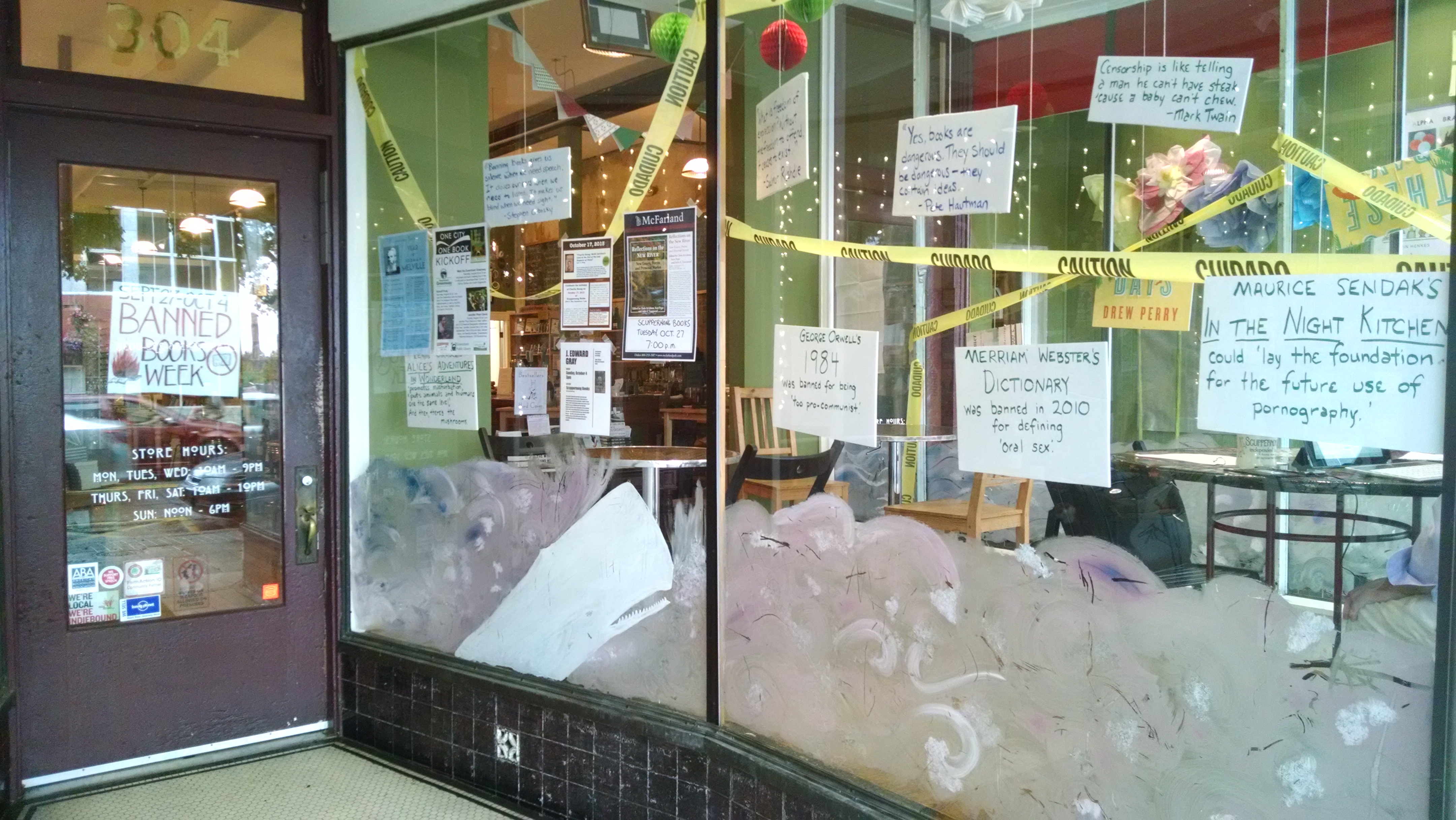- Categories:
Booksellers’ Creativity on Display During Banned Books Week
- By Liz Button
Nationwide, bookstores are putting their own unique spins on Banned Books Week (September 27 to October 3) with creative events, social media posts, and eye-catching displays that celebrate the freedom to read.
This year’s event focuses on YA books that have been challenged or banned, which over the years have included The Absolutely True Diary of a Part-Time Indian by Sherman Alexie, The Perks of Being a Wallflower by Stephen Chbosky, and John Green’s Looking for Alaska.
At Bookmans Entertainment Exchange stores in Flagstaff, Mesa, Phoenix, and Tucson, Arizona, booksellers and customers have been taking mug shot-style banned book selfies using a DIY photo backdrop set up at each location. The backdrop is adorned with a catchphrase from Bookmans’ anti-censorship campaign: “Caught Reading Banned Books at Bookmans.” Store staff is encouraging customers to share their selfies on social media with the hashtags #BannedBookSelfie and #IReadBannedBooks.
Bookmans Marketing Director Sheila Kressler-Crowley said the stores’ Banned Books Week celebration is just one part of an annual month-long anti-censorship campaign, which the store has been doing every September since 1994. Throughout the month, Bookmans six stores are hosting a variety of events highlighting different banned books, and the store has created T-shirts and bookmarks with the “Get Caught Reading Banned Books" slogan.
Kressler-Crowley said that freedom of speech is one of Bookmans’ core values listed on the store website’s “About” page.
“Over the years, we’ve done [anti-censorship campaigns focusing on] all forms of media, including music and video games: all the various lines of product we carry. Each year we do a different product focus,” she said.
In Florida, booksellers from Books & Books’ locations in Coral Gables, Miami Beach, and Miami's Arsht Center have also posted mug shots of themselves with their favorite banned books.
Aaron Curtis, who works in the buying department at Books& Books, said he was personally affected by the banning of Sherman Alexie’s 2003 short story collection Ten Little Indians (Grove), which in 2012 was boxed up and confiscated from classrooms in Tucson, Arizona, under H.B. 2281, the state’s law banning certain ethnic studies curricula in schools.
“Sherman Alexie is a Spokane. I am an Akwesasne Mohawk,” Curtis said. “Our histories are as different — and as similar — as Denmark and Germany, as Ghana and Kenya, but our families have chewed some of the same dirt. His work speaks to me in a way that other authors not just don’t, but simply can’t. The idea that an Indian in Tucson can’t find a voice in literature that holds a mirror to his or her life in their own schools, it’s unconscionable."
At Richmond, Virginia’s bbgb tales for kids, staff kicked off Banned Books Week with an event featuring Steve Sheinkin, author of the book Bomb: the Race to Build — and Steal — the World’s Most Dangerous Weapon (Flash Point), a nonfiction title for young adults. Sheinkin’s new book, The Port Chicago 50: Disaster, Mutiny, and the Fight for Civil Rights (Roaring Brook Press), was longlisted for the 2014 National Book Award in the Young People’s Literature category.
bbgb is also inviting customers to post the titles of their favorite banned books on a special display wall, and throughout the store banned books are highlighted with explanations as to what the books are about and why they were banned.
”That’s the big question that many people have: Why was this book banned? Why don’t people like it?” said bookseller Maya White-Lurie. “Many people find the reasons very surprising. The main reaction from a lot of our customers has been surprise, that books in our day and age are still being challenged and banned."
On Tuesday at Housing Works Books in New York City, Banned Books Week’s sponsors, including the American Booksellers for Free Expression, presented “Celebrating Banned Books Week: A Conversation With Banned and Challenged Young Adult Authors.”
Panelists included David Levithan, author of Boy Meets Boy and Two Boys Kissing (Knopf Books for Young Readers); Meg Medina, author of Yaqui Delgado Wants to Kick Your Ass (Candlewick), which has been banned in some areas due to its title; and Coe Booth, author of Kinda Like Brothers (Scholastic). The moderator was David Shipler, whose book The Working Poor: Invisible in America (Knopf) was challenged in Texas for being “sexually explicit.”
ABFE Executive Director Chris Finan, who introduced the authors, noted that the event was one of the most prominent events at a bookstore during Banned Books Week. The discussion, which was filmed by Book TV, focused on each author's experience of having their books banned or challenged.
“David Levithan, the author of many books with gay characters, said he believed that challenges to LGBTQ books may have peaked,” said Finan, “but Coe Booth and Meg Medina described the difficulties they have faced with their books, which are about African-American and Latino characters.”
On September 30, The Book House in Maplewood, Missouri, helped organize a banned book open mic night at the St. Louis Public Library. People were invited to read from their favorite banned books and to enjoy mocktails from Tavern of Fine Arts, a local wine bar and music venue. That same night, the store turned its weekly Wednesday evening improv show into an impromptu Banned Books Readout.
In addition to creating displays throughout the store, The Book House posted a Banned Books Week video, which staff created for its 2014 celebrations, on the store website.
An in-house reading of banned books by customers and staff is planned for October 3, and owner Michelle Barron said she is expecting a lot of high school kids and younger people to attend the readout event.
To get more adults involved, “we’re also going to extend the event into the evening, to have more of a group discussion,” she added. “Starting at 8:00 p.m., there will be beer and drinks, and people can read and discuss books late into the night.”
This year, booksellers at Books Inc. in San Francisco made a video to celebrate Banned Books Week, which is posted on the store’s website. Bookseller Elena Eustaquio, who came up with the idea, collaborated with fellow staff member George Seamer and Kyle Garrett of Seven Summits Productions, a friend of the store who volunteered his time to help.
Booksellers created the 15-second stop-action video, which was filmed at the store’s Opera Plaza location over the course of two hours on a Saturday, by arranging different banned books to spell out the words “I Read Banned Books.”
“I thought it would be an eye-catching and fun way to spread the word about Banned Books Week,” Eustaquio said. To make the video, “George pulled books from stock … then we all built the letters one book at a time and pulled each book away one by one, starting from the last letter and working our way up to the ‘I’ at the top. Then Kyle edited away the people in the shots and voila! Books declaring their love of fREADom.”
Customers who passed by as the video was being shot were very curious, and booksellers were able to engage them in conversations about Banned Books Week, Eustaquio added.
“When they looked at the spread of books that were included, they couldn’t believe things like Green Eggs & Ham, Charlie and the Chocolate Factory, and The Hitchhiker’s Guide to the Galaxy had been banned,” she said.
Other bookstores also demonstrating creativity in their Banned Books Weeks festivities include:
- Poor Richard’s Downtown in Colorado Springs, Colorado, created a Banned Books Week mural to decorate the North Wall of its building.
- Books & Books’ Coral Gables store sponsored a screening of Stanley Kubrick’s film adaptation of Vladimir Nabokov’s much-banned Lolita at a local theater.
- Book Soup in Los Angeles, California, co-sponsored WeHo Reads’ all-day event on September 26, which served as the culmination of the West Hollywood literary community’s year-round author series.
- Inkwood Books in Haddonfield, New Jersey, created a quiz for their store window display. People walking by the shop could stop and write down answers to banned books-related questions, then turn in their guesses to enter a prize drawing. Owner Julie Beddingfield said, “We’ve heard lots of fun discussions outside as people walk by and try it out!”
- Colgate Bookstore in Hamilton, New York, is donating 13 percent of adult trade book sales during Banned Books Week to the Hamilton Public Library.
Publishers, too, are supporting Banned Books Week with events, giveaways and promotions, and social media posts. The Association of American Publishers, a founding member of Banned Books Week, provides a look at some of the highlights here.




